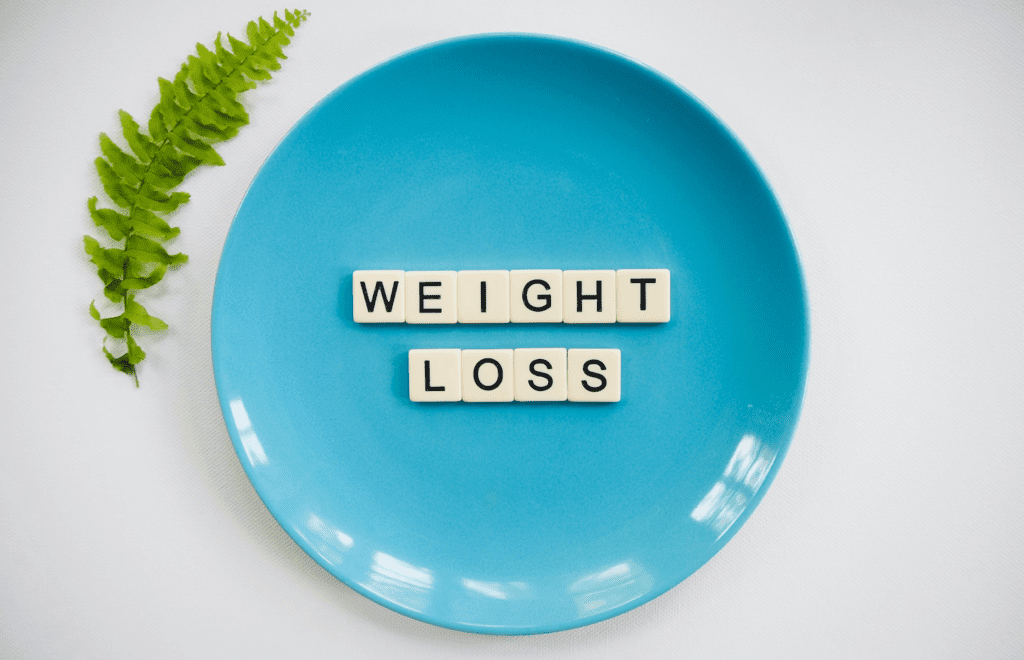Sustainable weight loss goes beyond temporary diets and quick fixes; it’s about adopting healthy habits that promote lasting transformation. In this article, we will explore proven strategies for achieving and maintaining your ideal weight in a healthy and effective way.
We will cover everything from the importance of a balanced diet and regular exercise to portion control and proper hydration. Additionally, we will discuss how psychological support and continuous monitoring are essential to overcoming challenges and avoiding the yo-yo effect. With these practical and well-founded tips, you will be prepared to successfully reach and sustain your weight loss goals.

📜Contents
- 1 Healthy Eating for Weight Loss 🎯
- 2 Natural Weight Loss Supplements 🍃
- 3 Regular Physical Activity for Weight Loss 🏃♂️
- 4 Portion Control and Caloric Intake 🥗
- 5 Importance of Hydration ⚠️
- 6 Psychological and Motivational Support 🧠
- 7 Continuous Monitoring and Adjustments 🧮
- 8 Avoiding the Yo-Yo Effect 🪀
- 9 Conclusion 💥
- 10 Also Read – More Posts 💡
Healthy Eating for Weight Loss 🎯
How to Balance Your Diet for Weight Loss
A balanced diet is the foundation of healthy and sustainable weight loss. To create meals that promote satiety and nutrition, it is essential to include a variety of foods that provide all the macronutrients: proteins, carbohydrates, and fats.
Proteins help build and repair tissues, and they also promote a greater feeling of fullness. Carbohydrates, especially complex ones, are the body’s primary energy source and should be consumed in moderation, with preference given to whole grains, fruits, and vegetables.
Fats, on the other hand, are essential for the absorption of vitamins and the proper functioning of the body. It is important to choose healthy sources such as avocados, nuts, and olive oil.
Meal Planning
Planning meals ahead of time is a powerful strategy for maintaining healthy eating habits, especially during weight loss. Setting aside time each week to plan the menu, prepare ingredients, and even cook some meals can save time and reduce stress during the week.
Additionally, having healthy snacks on hand prevents impulsive and less healthy choices. Tips like cooking in large quantities, dividing into portions, and storing in appropriate containers can help maintain consistency and quality of meals throughout the week.
Mindful Eating
Mindful eating is a technique that teaches paying full attention to the act of eating, recognizing the body’s hunger and fullness signals. This means eating slowly, savoring each bite, and noticing how the body reacts to the food.
This practice helps avoid emotional eating, which is common during moments of stress or anxiety, and to develop a healthier relationship with food. By being present during meals, you can identify when you are truly satisfied, avoiding overeating and contributing to more effective weight loss.

Natural Weight Loss Supplements 🍃
Using natural supplements is an excellent way to complement the treatment and promote balanced health. These products provide essential nutrients that are often difficult to obtain solely through diet. Nagano Tonic, for example, is a standout natural supplement due to its potent and innovative formula. Unlike other options, it directly targets a dormant metabolism, helping accelerate fat loss, increase energy levels, and provide a renewed sense of youth.

Regular Physical Activity for Weight Loss 🏃♂️
Effective Exercises for Weight Loss
Regular exercise is essential for sustainable weight loss. Some of the most effective types of exercises for burning fat include High-Intensity Interval Training (HIIT), strength training, and cardiovascular exercises such as running, cycling, and swimming.
HIIT, in particular, is known for continuing to burn calories even after the workout ends, while strength training helps increase muscle mass, which speeds up metabolism. The combination of aerobic (cardio) and anaerobic (strength training) activities maximizes fat loss and improves body composition.
Establishing an Exercise Routine
For exercise to be effective in the long term, it is essential to create a routine that fits your lifestyle and is sustainable. This means choosing activities you enjoy, setting consistent schedules, and starting with realistic goals.
Motivation can be maintained by varying the types of exercises, setting clear goals, and rewarding yourself for progress. Remember, consistency is key—it’s better to exercise a little regularly than to try to make up with intense and sporadic sessions.

Portion Control and Caloric Intake 🥗
How to Manage Food Portions
- Reducing portion sizes is an effective strategy for controlling caloric intake without sacrificing nutrition. This can be done by using smaller plates, paying attention to recommended portions on food labels, and avoiding eating directly from the packaging. Additionally, practicing mindful eating can help identify when satiety is reached, preventing overeating.
The Role of Caloric Intake in Weight Loss
- To lose weight, it is necessary to create a caloric deficit, meaning consuming fewer calories than the body needs to maintain its current weight. Calculating ideal caloric intake can be done with the help of apps or online tools, which take into account factors such as age, gender, weight, height, and level of physical activity. Keeping a food diary can be useful for monitoring daily intake and ensuring that you are on track to meet your weight loss goals.

Importance of Hydration ⚠️
How Water Helps With Weight Loss
- Staying hydrated is essential for the proper functioning of the body and can aid in weight loss. Water helps control appetite, improves metabolism, and aids digestion. Often, the body can confuse thirst with hunger, leading to unnecessary food consumption. Therefore, drinking water throughout the day, especially before meals, can help reduce total caloric intake.
Tips to Increase Water Intake
- To ensure that you stay well hydrated, establish the habit of drinking water regularly. Carrying a water bottle during the day, setting consumption goals, and even adding slices of fruits or herbs for flavor are effective ways to increase water intake. Monitoring consumption through apps can help create a hydration routine that will become automatic over time.

Psychological and Motivational Support 🧠
Dealing with Emotional Obstacles
The weight loss journey is not just physical, but also mental. Emotional obstacles such as stress, anxiety, and lack of self-confidence can hinder progress. Developing strategies to deal with these emotions is crucial.
Practices such as meditation, cognitive-behavioral therapy, and support from friends and family can provide the necessary support to overcome these challenges. In more severe cases, seeking the help of a mental health professional can be extremely beneficial.
Maintaining Motivation
Keeping motivation throughout the weight loss journey is one of the biggest challenges. Setting realistic and tangible goals, celebrating small achievements, and maintaining a positive mindset are essential.
Tracking progress, whether through photos, measurements, or journals, can serve as a visual reminder of what has been achieved, encouraging continuity. Engage with support communities, both online and offline, to share experiences and stay motivated.

Continuous Monitoring and Adjustments 🧮
Tracking Weight Loss Progress
- Monitoring progress is essential to ensure that weight loss strategies are working. This includes weighing yourself regularly, measuring body circumferences, and monitoring physical activity levels. This data provides valuable insights into what is working and what may need adjustments.
- However, it is important to remember that the number on the scale is just one indicator and should be complemented with other signs of progress, such as a sense of well-being and increased energy.
Adapting Habits for the Long Term
- Sustainable weight loss depends on turning temporary changes into permanent habits. This requires flexibility and the ability to adjust strategies over time as new routines are established and goals evolve. Maintaining a realistic approach and being willing to make adjustments when necessary is key to sustaining results in the long term.

Avoiding the Yo-Yo Effect 🪀
Strategies to Maintain Weight After Reaching the Goal
Avoiding the yo-yo effect, or regaining weight after the initial loss, is a common challenge. The key to maintaining weight is to continue with the healthy practices that led to weight loss, even after reaching the goals.
This includes maintaining a balanced diet, exercising regularly, and continuing to monitor progress. Setting new goals and challenges, such as improving physical performance or learning new healthy recipes, can help maintain motivation and focus.

Conclusion 💥
Sustainable weight loss is the result of consistent and conscious lifestyle changes. By adopting a balanced diet, exercising regularly, controlling portions, staying hydrated, and taking care of your mental health, you create a solid foundation for achieving and maintaining your ideal weight.
Remember that progress can be gradual, but with dedication and continuous adjustments, the results will be lasting. Maintaining healthy habits after reaching your goals is crucial to avoiding the yo-yo effect and ensuring long-term well-being. With these strategies, you will be on the right path to a healthier and more balanced life.
Also Read – More Posts 💡





[…] Weight Loss: 7 Sustainable Tips for Weight Loss Success […]
[…] Weight Loss: 7 Sustainable Tips for Weight Loss Success […]
[…] Weight Loss: 7 Sustainable Tips for Weight Loss Success […]
[…] Weight Loss: 7 Sustainable Tips for Weight Loss Success […]
[…] Loss: 7 Sustainable Tips for Weight Loss […]
[…] Weight Loss: 7 Sustainable Tips for Weight Loss Success […]